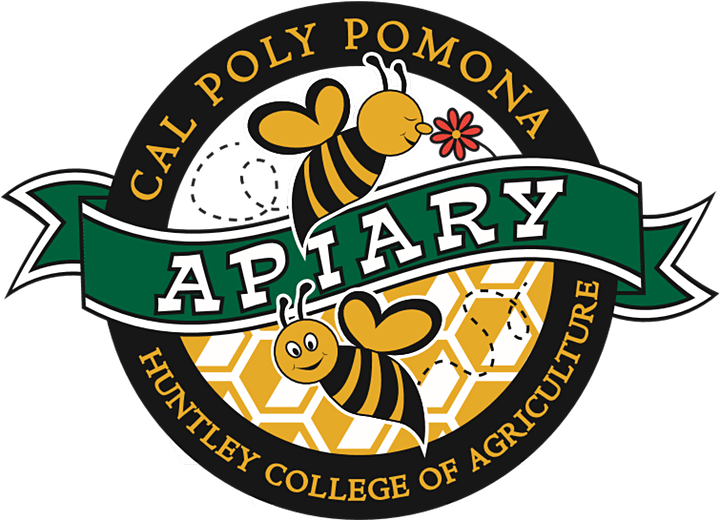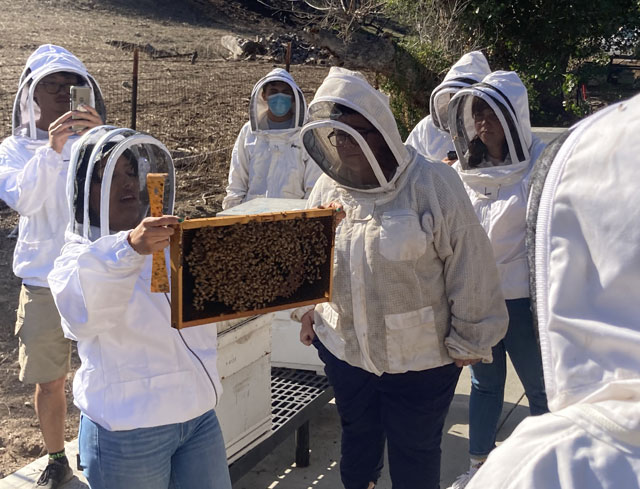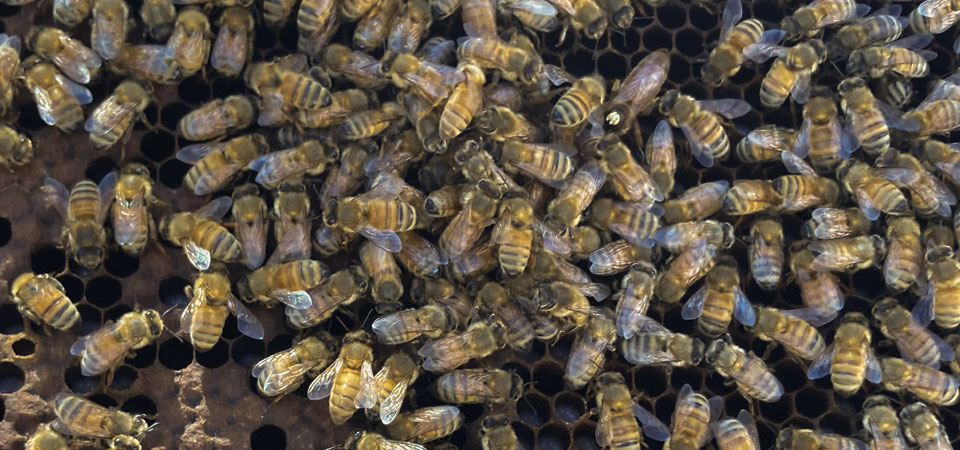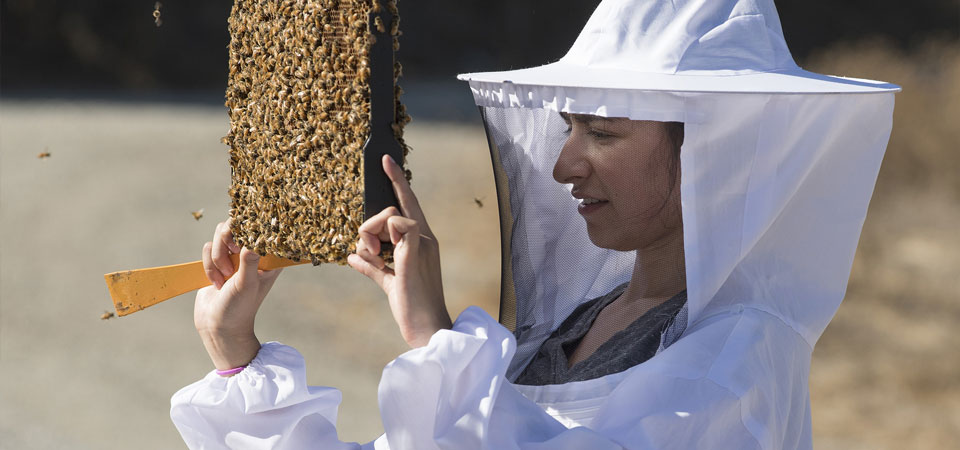Apiary Program (honey bees)

Overview
At the Department of Plant Science in the Huntley College of Agriculture, we are proud to offer a comprehensive course-based beekeeping program that allows students to explore the fascinating world of beekeeping while gaining professional knowledge and skills. Whether you’re a seasoned bee enthusiast or a beginner looking to get started, our program has something to offer students from all majors at Cal Poly Pomona.

Why Beekeeping?
Beekeeping is not just about honey production; it plays a crucial role in pollination and ecosystem health. As concerns about declining bee populations grow, beekeepers are in high demand to help sustain these vital pollinators. Our program provides students the expertise needed to make a difference.
Program Highlights:
- Hands-On Experience: Our courses emphasize practical skills. You’ll work directly with hives, learning everything from hive management to honey extraction and candle-making to participation in public outreach and education events.
- Expert Faculty: Our experienced faculty members are passionate about beekeeping and committed to your success. They bring real-world insights and the latest research to the classroom.
- Comprehensive Curriculum: Our courses cover bee biology, hive construction, disease management, and even the business aspects of beekeeping.
- Apiary Facility: You’ll have access to our 2-acre campus apiary with hives managed by Commercial and California Master Beekeeper co-instructors.
- Field Trips: Explore local beekeeping operations and gain insights from industry and university research experts through our field trips and guest lectures.
Career Opportunities
With our beekeeping coursework, you’ll be prepared for a range of rewarding career paths:
- Beekeeper
- Apiary Manager
- Pollination Consultant
- Honey Production Specialist
- Agricultural Extension Farm Advisor
- Conservationist (honeybees and native pollinators)
Courses
Courses from all colleges and majors are welcome to enroll in PLT 3360/L – Bee Science lecture and co-requisite lab. No pre-requisites or prior experience with bees needed.
Core Courses
Care, management, and manipulation of bees. Practical application of principles for effective establishment and maintenance of apiaries. Pollination and value of bees to agriculture. Recognition and control of bee diseases. Recognition and importance of native, commercial and introduced plants as nectar and pollen sources.
Corequisite(s): PLT 3360L.
Component(s): Lecture
Contact Hour(s): 2 hours lecture/discussion.
Grading Basis: Graded including RP
Repeat for Credit: May be taken only once
Course Category: Major Course
Care, management, and manipulation of bees. Practical application of principles for effective establishment and maintenance of apiaries. Pollination and value of bees to agriculture. Recognition and control of bee diseases. Recognition and importance of native, commercial and introduced plants as nectar and pollen sources.
Corequisite(s): PLT 3360.
Component(s): Laboratory
Contact Hour(s): 3 hours laboratory.
Grading Basis: Graded including RP
Repeat for Credit: May be taken only once
Course Category: Major Course
Want to take your knowledge and skills to the next level?
Group study at an advanced level of a selected well-defined topic or area not covered by a regularly offered course.
Component(s): Activity
Grading Basis: Graded including RP
Repeat for Credit: May be taken multiple times only with different topics
Repeat for Credit Limit: 5
Minimum - Maximum Units: Total credit limited to 6 units applicable to a degree, with a maximum of 2 sections per semester.
On the job experience with private industry or public agencies. Professional type experience new to the student to provide career development. Minimum 160 hours. May be taken up to three times for a total credit of 3 units.
Prerequisite(s): Junior Standing.
Component(s): Supervisory
Grading Basis: Graded including RP
Repeat for Credit: May be taken multiple times
Repeat for Credit Limit: 3
Course Category: Major Course
An analytica investigation of a Plant Science reearch project of special interest to the individual student, working under faculty supervision and culminating in a formal, rhetorical report. 160 hours minimum. May be taking up to two times for a total credit of 2 units.
Prerequisite(s): Junior Standing.
Component(s): Supervisory
Grading Basis: Graded including RP
Repeat for Credit: May be taken multiple times
Repeat for Credit Limit: 2
Course Category: Major Course
We encourage PLT 4410 Internship students to complete a paid work experience with various commercial and educational beekeeping programs or pursue PLT 4610 Senior Project research under direction of a faculty member. Instructor consent required, please contact instructor for details.
Location:
Department of Plant ScienceCal Poly Pomona - Huntley College of Agriculture
3801 W. Temple Avenue
Pomona, CA 91768
Telephone:
(909) 869 – 2214Join Us in Preserving the Buzz:
Be a part of something extraordinary – support the Cal Poly Pomona Plant Science Department Apiary Program and play a vital role in empowering our students to preserve their environment and develop expertise in sustainable agriculture. Together, we can make a difference.
Thank you so much for considering a Donation.
Your donation will be directed towards student experiential learning and their professional development through paid stipends for Bee Science research projects on campus and off-campus internships (farms, non-profit organizations, botanical gardens, schools, companies, and more). In addition, donations will be used for the repair of equipment and purchase of supplies and tools that enhance our apiary lab capacity for student learning.
We welcome additional ideas or questions, please contact Eileen Cullen, Ph.D., Plant Science Department Chair, emcullen@cpp.edu

